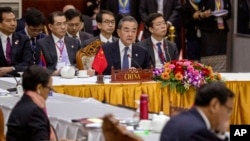As China emerges from the COVID-19 crisis earlier than most nations, it has the time and resources to switch focus to other priorities, such as its relations in Southeast Asia. But for those who worry that Beijing will outspend other world powers to buy influence, there’s still time for the U.S. to counter that influence, according to a former U.S. economic envoy to China. And it might not be as hard or as expensive as some think.
In a new Brookings Institution report, economist David Dollar analyzes China’s Belt and Road because it’s the main initiative Beijing uses to spread influence by spending on infrastructure in more than 100 nations. It’s grown so large that the U.S. hit back with its own “Indo-Pacific” spending program and blasted Belt and Road loans as “debt-trap diplomacy.”
“China peddles corrupt infrastructure deals in exchange for political influence,” U.S. Secretary of State Mike Pompeo said in May 2019. “Its bribe-fueled debt-trap diplomacy undermines good governance.”
Alternatives
There are several ways the U.S. should respond to these Chinese decisions, said Dollar, who served as an economic envoy for the U.S. Treasury in Beijing from 2009-2013 and is now a senior fellow in the China Center at the Brookings Institution.
First, there is strength in numbers; the U.S. should team up with other liberal democracies such as Japan and Australia to offer Southeast Asian nations a foreign aid alternative to China, a one-party state, Dollar said.
His second recommendation is for those like-minded democracies to provide technical advisers to members of the Association of Southeast Asian Nations. So ASEAN economies might continue to take Chinese money, but the advisers can give guidance “to intelligently open their sectors and to manage the complex contracts that are typical in infrastructure,” he wrote in the report.
“While the U.S. initiative criticizes China’s lending, it does not offer ASEAN countries much in the way of alternative financing as Western aid has declined and shifted away from infrastructure,” said the report released last month, titled “China and the West Competing Over Infrastructure in Southeast Asia.”
Third, the U.S. can not just team up with other democracies but also strengthen its tie-ups with the International Monetary Fund and the World Bank, Dollar said. He called these global organizations “best placed” to help developing ASEAN nations manage their Chinese projects, from a rail line in Malaysia to tools for flood management in the Philippines. However he also acknowledged that the organizations would have to do “more risk-taking” to give riskier loans to ASEAN borrowers who would otherwise get deeper into debt with China.
The nation that Dollar views to be most at risk of Chinese debt distress in the region is Laos, a small landlocked nation that borders China. The focus on the Belt and Road impact on Southeast Asia is relevant not only because of the region’s proximity to China but also because three of the 20 biggest borrowers in the program are in ASEAN: Cambodia, Indonesia and Laos.
A fourth recommendation from Dollar may have a harder time getting traction: the U.S. could work more closely with China and join its Asian Infrastructure Investment Bank. The U.S. opposed the development bank when it was founded in 2015, urging allies like South Korea not to join, citing concerns about transparency, environmental rules and other standards.
“What we don’t want to see happen is some kind of race to the bottom where the standards are diluted,” Antony Blinken, Deputy U.S. Secretary of State, said at the time.
Washington has softened its stance since then, but still has yet to join the China-led bank.
Such cooperation is needed, particularly as COVID-19 tears through ASEAN economies and increases their financing needs, Dollar said.
“U.S. accusations of China’s ‘debt-trap diplomacy’ do not resonate with much of the developing world and make the United States seem insecure,” he said, adding one more recommendation: “Dial down the anti-China rhetoric.”




